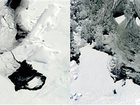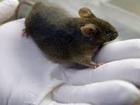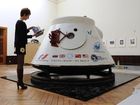Air that's cleaner inside your car than on the outside -- in smog-weary China it's an attractive sales pitch, and the world's biggest automakers are racing to cash in.
To drive the point home, thick smog blanketed the Chinese capital when the Beijing auto show opened to the public in the past week, showcasing more than 1,000 vehicles in the globe's largest car market.
 Full Story
Full Story
The smallest and least known of Spain's Canary Islands, El Hierro, is making a splash by becoming the first island in the world fully energy self-sufficient through combined water and wind power.
A wind farm opening at the end of June will turn into electricity the gusts that rake the steep cliffs and green mountains of the volcanic island off the Atlantic coast of Africa.
 Full Story
Full Story
A German wildlife rescue project is deploying small aerial drones to find and protect young deer hiding in tall grass from being shredded by combine harvesters cutting hay in spring.
The pilot project has shown great promise in spotting the young animals, about 100,000 of which fall victim in Germany every year to the large agricultural machines, said project spokesman Rolf Stockum on Friday.
 Full Story
Full Story
A Japanese whaling fleet is set to leave port Saturday in the first hunt since the U.N.'s top court last month ordered Tokyo to stop killing whales in the Antarctic.
The departure of ships from Ayukawa in the country's northeast marks the annual start to a coastal whaling program not covered by the International Court of Justice's landmark ruling -- which found Japan's Southern Ocean expedition was a commercial activity masquerading as scientific research.
 Full Story
Full Story
Kazakhstan's first-ever Earth observation satellite is to be fired into orbit next week from the European spaceport in Kourou in French Guiana, launch company Arianespace said.
The 830-kilogram (1,829-pound) orbiter will provide Kazakhstan with data for mapmaking and security, monitor changes in nature and agriculture, and provide support for rescue operations in case of natural disaster, it said in a statement.
 Full Story
Full Story
Scientists said Thursday they have cracked the genetic code of the tsetse fly, potentially helping to tackle one of sub-Saharan Africa's most devastating livestock diseases as well as human sleeping sickness.
"Decoding the tsetse fly's DNA is a major scientific breakthrough," said Kostas Bourtzis from a joint body of the U.N. Food and Agriculture Organization and the International Atomic Energy Agency which sequenced the genome in a 10-year international effort.
 Full Story
Full Story
Bollywood's glitterati on Thursday heard an appeal to use their star power to fight climate change as they opened their first awards ceremony in the United States.
Bringing a somber note in the midst of Bollywood's trademark festive dancing, Rajendra Pachauri, the Indian scientist who leads the Nobel Prize-winning U.N. climate panel, took the stage in Tampa, Florida, to urge stars to channel their influence for the planet.
 Full Story
Full Story
Scientists are watching an iceberg bigger than the island of Guam as it slowly moves away from an Antarctic glacier.
NASA scientist Kelly Brunt said it is more a wonder than a worry and is not a threat to shipping or sea level rise.
 Full Story
Full Story
Spanish scientists have for the first time used gene therapy to reverse memory loss in mice with Alzheimer's, an advance that could lead to new drugs to treat the disease, they said Wednesday.
The Autonomous University of Barcelona team injected a gene which causes the production of a protein that is blocked in patients with Alzheimer's into the hippocampus -- a region of the brian essential to memory processing -- in mice that were in the initial stages of the disease.
 Full Story
Full Story
For those who have everything, how about a Soviet-era space capsule dating back to the 1970s, when it carried three cosmonauts into space?
German firm Lempertz unveiled plans Wednesday for what it says is the first such auction in Europe, with the capsule expected to fetch up to 1.4 million euros ($1.9 million) on May 7.
 Full Story
Full Story



